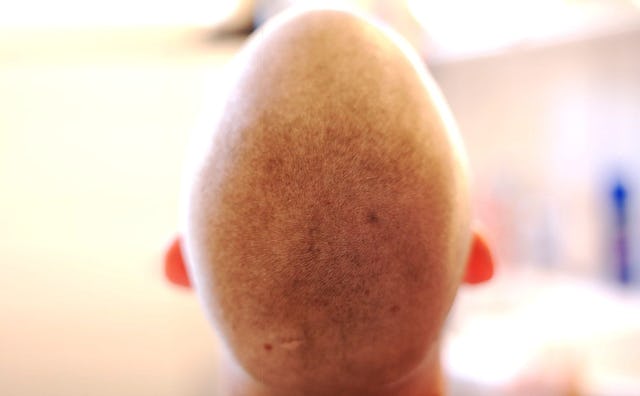My 12-Year-Old Shaved His Head This Weekend. Here's What Happened

My son is not yet an angst-filled teenager with pierced body parts and a tattoo. He is a thoughtful, sweet 12-year-old who’s interested in Star Wars and basketball. So why the shaved head?
Michael has always liked short haircuts. He thinks Marines look cool. He likes not having to brush his hair. Every time he gets a haircut he tells the barber to get out the electric clippers and give him a “one buzz, please.” I frantically signal Mario in the mirror, mouthing “not too short” and shaking my head. Michael had been bugging us for a while to let him shave his head. For some reason he thinks it would be cool, and he’s thrown all the basic reasoning we’ve ever used as parents right back at us:
“You always say a bad haircut isn’t a big deal.”
“It’s my head, why can’t I shave it?”
And the eternal plea of children everywhere:
“You never let me do anything I want.”
The fact that my husband remembered fighting with his father over hair just added to our parental dilemma. But back in the day, it was my husband’s hair that was too long and his father demanding the crew cut. My husband, David, vowed that when the blessed day came that he was lucky enough to have a son of his own, he would never fight over hair. He vowed to be the cool father who was OK with any hairstyle or length.
So it was my husband’s bright idea to give in. Let Michael have his way and shave his head. Small acts of rebellion for small people, was David’s reasoning. Let Mike learn that everything you wish for might not be as much fun as you imagine. It was our experiment in parenting. I just tried not to watch as the hunks of soft light-brown hair fell away from my baby’s head.
At first, there was the initial glee of flashing his bald head at his friends—and watching their shock and amazement that he had actually done what he had bragged he would do. Michael basked in the glory of being “the kid whose parents let him do anything.” I cringed, because it’s obvious that I’m the parent who has no control over her child. But Michael is realizing that maybe being bald isn’t the best.
Strangers stare at his head, wondering what medical misfortune has befallen him. Girls bug him, and he’s still at an age where girls are annoying, asking if they can touch his scalp. Most surprising, he’s cold all the time. In one swoop of the clippers, Michael went from living in shorts and flip-flops to bundling up like Grandma intended. He loops a sweatshirt over his shoulders in case the breeze picks up. His baseball cap is his constant companion. It’s only been a few days and already the novelty is wearing off. Thank God.
From the beginning, my husband’s plan was to let Michael have this small victory, and we would win the eventual war. Let him get the rebellion out of his system when it was a relatively harmless kind of rebellion. I had no such illusions. I didn’t really believe that just because we let him shave his head, he would lose all interest in staying out late, drinking beer or begging to drive my car in a few years. I didn’t think it would work, but it has. For at least this week.
For this week, Michael has stopped bugging us about things he’s not allowed to do. He had the opportunity to make a big decision and doesn’t seem eager to take on any further responsibility. He tested his wings and has returned to the nest for a sweater. Making adult decisions hasn’t turned out exactly the way he planned, which is exactly what my husband and I had hoped for.
We took a small parenting risk—a cosmetic one with no long-term consequences—and I think it’s worked out to our advantage. Granted, I’ve had to reconcile myself to the fact that every adult who sees Michael’s bald head must be wondering what kind of nuts his parents are. But we hope that Michael has learned his lesson. As he gets older he’ll have plenty of chances to test his autonomy and have to live with the results. Because after all, hair grows.
This article was originally published on